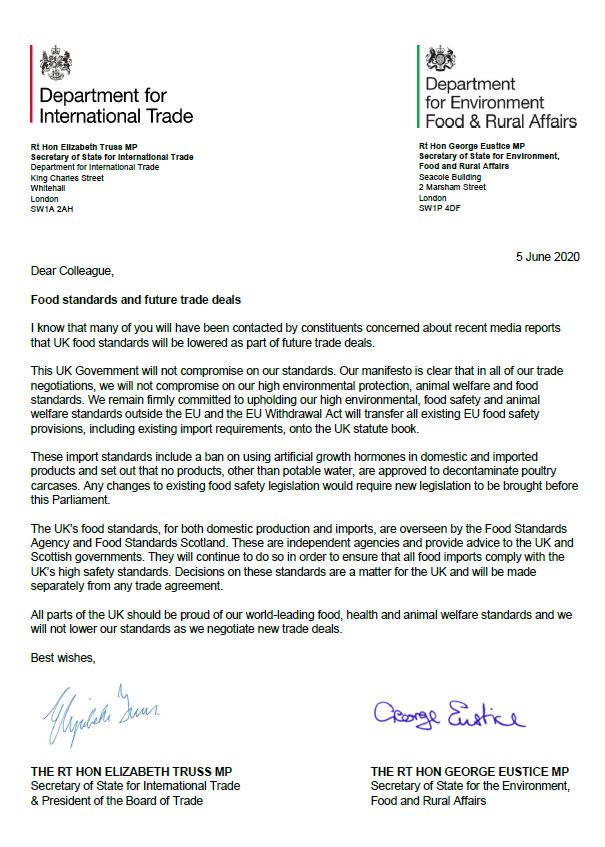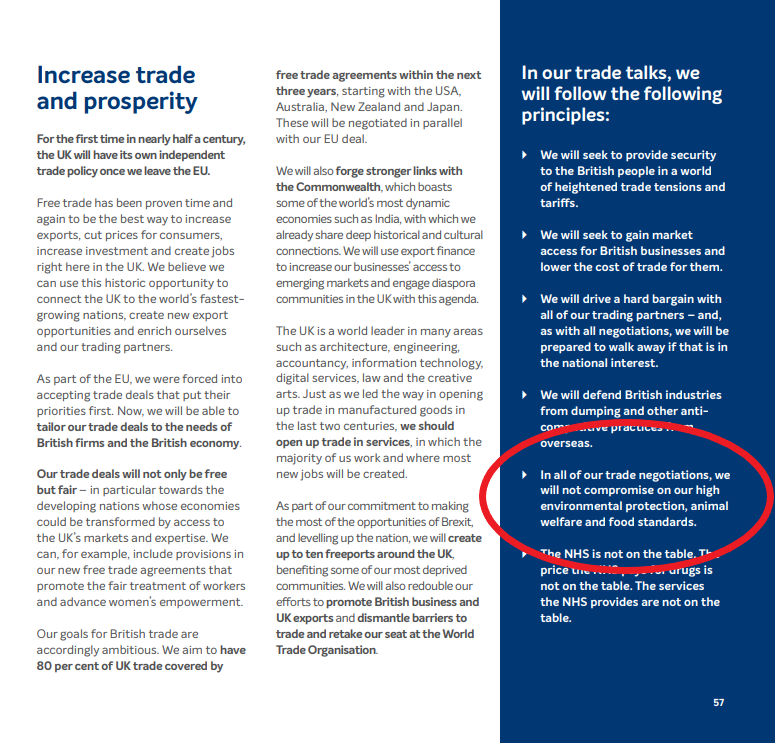
There are reports in the press today that Lord Curry’s amendment to the Agriculture Bill due be debated tomorrow, will not be debated. This has been described as a “government move”. In truth, this is actually a technical matter that has come from the Speaker of the Commons 1/
Although the Speaker's call, the government could, if it wished, enable a debate/vote on the amendment. Furthermore, there will still be a debate on the issues of food standards and on strengthening the remit of the Trade & Ag Commission re trade deals and standards. A thread: 2/
Lord Curry’s amendment represents a sensible approach on the issue of trade and standards, allowing the government to pursue its independent trade policy, signing new trade deals, while giving Parliament a greater say on those deals 3/
nfuonline.com/news/latest-ne…
nfuonline.com/news/latest-ne…
But this sudden issue with the amendment arises due to a rare and unforeseen technical issue relating to Parliamentary conventions and the purposes for which any public money can be spent under the Bill, including the exciting notion of "unwaivable privilege.."! 4/
Any Bill that gives rise to public expenditure – e.g. the Agriculture Bill – requires a Money Resolution to be passed early in its passage authorising such expenditure. Without this no money under the ensuing Act can be spent (or indeed tax collected) 5/
parliament.uk/site-informati…
parliament.uk/site-informati…
Often, such resolutions are drafted very broadly, allowing for pretty much any expenditure that may arise under the Bill. Sometimes, they are drafted narrowly, being much more specific about what can (and can’t) be financed under the Bill 6/
You guessed it – the Agriculture Bill Money Resolution is drafted narrowly. And it appears that the Speaker will rule that the establishment of the Trade and Agriculture Commission would require the sort of expenditure not currently authorised 7/
This is where the additional principle of financial privilege comes into play, a very long-standing right which asserts that the House of Commons alone has sole responsibility for legislating for taxation and expenditure 8/
parliament.uk/site-informati…
parliament.uk/site-informati…
This means, for instance, that when the Lords amends legislation to introduce or affect a government spending commitment, the Commons can reject it simply because it infringes their financial privilege - the Lords does not have the right to make such financial legislation 9/
In practice, the Lords does table these sorts of amendments to Bills, and the Commons is happy to accept them, in which case the Commons is deemed to have “waived its privilege”. This actually happens very often 10/
However, this option is not available if the type of expenditure isn't allowed under the relevant Money Resolution – a case of what is known as “unwaivable privilege”. The Commons is just not able even to consider the amendment as, crudely, it is legally impossible 11/
And it looks like this is what will happen to Lord Curry’s amendment. This is actually a very rare occurrence. The last time it happened was almost 10 years ago. But ultimately it is a technical issue that stops the amendment in its tracks 12/
Now, the government could remedy this by quickly passing a new Money Resolution to allow broader expenditure, or specific expenditure for the Trade & Ag Commission, before the Bill finally becomes law. But we know the govt is opposed to the Curry amendment, so its unlikely 13/
It is also possible that the Commons or Lords can bring another amendment “in lieu” of the offending amendment. It would have to be adjusted to account for the spending issue. This may yet happen further down the line 14/
I should add that the fact the TAC already exists is irrelevant to this technical issue. It is not currently a statutory body. Setting it up in law legally requires expenditure, so that is why the Money Resolution issue arises 15/
So what next for Monday’s debate on the Agriculture Bill? Fortunately, the issues covered by the Lord Curry amendment will still be debated, because a separate amendment (New Clause 16) is likely to be moved – known as Lord Grantchester’s amendment 16/
This amendment requires any imports under new trade deals to meet equivalent standards to UK production standards. The NFU has supported this amendment, although we know that MPs expressed concerns with the approach when they last debated the Ag Bill 17/
Nevertheless, it is crucial that MPs debate this amendment properly on Monday, and also the merits of the approach in the Lord Curry amendment, whether or not it can be called to a vote – it could still come back in the following days in a new form 18/
After Monday, the Bill returns to the Lords where they in turn consider what the Commons did. If they feel strongly on a particular issue (and a majority of over 100 voted for Lord Curry’s amendment), they ask the Commons to think again…again 19/
parliament.uk/about/how/laws…
parliament.uk/about/how/laws…
Ultimately, the NFU’s ask of MPs remains the same: push for a clear, comprehensive and binding commitment from government, on the floor of the House, to introduce measures to strengthen MP’s scrutiny of trade deals to safeguard our animal welfare and environmental standards 20/
We hope as many MPs as possible will speak in support of the principles contained in New Clauses 16 and 18, whether called to a vote or not, on Monday (ends/)
• • •
Missing some Tweet in this thread? You can try to
force a refresh







